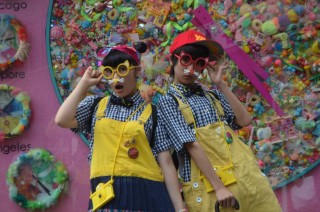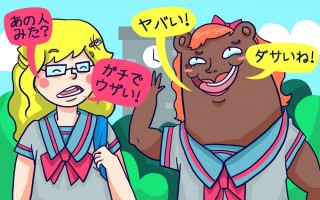▼ Drop The ‘dasai’ And Get ‘yavai’ With High School Slang
- Category:Other

JAPAN TIMES
Keeping up with 流行りの言葉 (hayari no kotoba, trending slang) and 流行語 (ryūkōgo, buzz words) is crucial for high schoolers. The last thing a teenager wants is to be called out on 古い (furui, outdated) lingo by their classmates. And if Mom or Dad are using it, that might as well be the sound of the last nail being hammered into the coffin of coolness.
So if you’re still saying あげぽよ (age-poyo, feeling excited) and さげぽよ (sage-poyo, feeling disappointed), take note: That ship has sailed.
Let’s say you’re in a situation where you’ve just finished a juice-cleanse diet and are about to devour a juicy, calorie-heavy hamburger. Instead of expressing your excitement with age-poyo, use the current hayari no kotoba: 神がかってる (kami gakatteru, “It’s so heavenly”).
According to high schoolers Karin-chan and Pi-chan, who tell us they’re up to date on slang, kami gakatteru is used when something tastes so heavenly that the spirits surely must have blessed it.
Karin-chan and Pi-chan are not your average 高校生 (kōkōsei, high schoolers), though. They are two of the members of the pop group Tempura
Kidz, a collective of four JK (女子高生 , joshi kōsei, high school girls) and one 男子校生 (danshi kōsei, high school boy) who are known for their electronic tunes, comical dance routines and colorful costumes. It’s worth noting that Tempura Kidz’ 先輩 (senpai, senior) at their AsobiSystem management company is none other than pop star きゃりーぱみゅぱみゅ (Kyary Pamyu Pamyu), who rose to fame based on her quirky character and a Twitter account full of Harajuku-area slang consisting mainly of 効果音 (kōka-on, sound effects) that have nonsensical meanings, like デュクシ (dukushi, a punch of anger) or ギャーー (gyaaa, a scream of excitement).
Although Karin-chan and Pi-chan (the sole male member) work in the 芸能界 (geinōkai, show-business world) — a world where you might imagine the majority of Japanese slang is born — the two teens make it clear that they learn hayari no kotoba first-hand from their senpai at school. Both members are in the first year of Japan’s three-year high school system.

“At school, our senpai talk to one another using different slang and the rest of us gradually catch on,” Karin-chan says. “But there were a few times when I was forced to ググる (guguru, Google) a word because I didn’t understand the meaning. That was embarrassing.”
One of the many slang terms 高3 (kō-san, third-year high schoolers) are currently using is LJK or ラスト女子高生 (rasuto joshi kōsei), a self-reverential noun identifying girls in this final year of high school. The problems faced by kids wrapping up school and about to enter the big wide world are pretty unique, and hence the term is apparently off-limits to their 後輩 (kōhai, juniors) in 高1 and 高2. These youngsters can only pretend to understand — perhaps by uttering a sympathetic それな〜 (sorenā, “So true”).
Lunch break is another good time to catch hayari no kotoba. When the same group of friends eat together every day, they may refer to themselves as いつメン (itsumen, always the same members) to identify themselves. いつメンでランチ (itsumen de ranchi, lunch with the usual crowd) or いつメンでプリクラ (itsumen de purikura, print club with the regular lot) have trended and spread quickly via Twitter and Instagram.
Just like with many other youth trends, though, there soon comes a time when what used to be trendy becomes ダサい (dasai, uncool). According to Pi-chan, students share an 暗黙の了解 (anmoku no ryōkai, unspoken agreement) regarding outdated slang.
“When everyone at school stops using slang like 空気読めない or KY (kūki yomenai, unable to read the situation) or わろた (warota, laughed — much like LOL),” Pi-chan explains, “you know that slang is over and you shouldn’t use it.”
Both teens say a lot of the slang they hear is heavily influenced by English. The men in itsumen comes from “member” and the “L” in LJK is, of course, “last.” イケボ (ikebo, handsome voice) — which, say Karin-chan and Pi-chan, is 流行りそうな言葉 (hayarisōna kotoba, slang that’s likely to trend) — is also a term with a dash of English: the bo comes from ボイス (boisu, voice). If you pass by anyone on the street with a deep, attractive tone of voice that sounds like it could be in an anime, you have spotted an ikebo!
So, if you’re a non-native learning Japanese who is working or studying in a school environment here, it might be a good idea to switch off from the dasai adults every now and then and eavesdrop on the zatsudan (雑談, idle chatter) among the Japanese students.
Tempura Kidz’ tips
ファボ: fabo, favorite (on Twitter)やヴァイ: yavai, dangerous/amazing (not yabai — emphasize the “v”)
りょ: ryo, agree/understood (shortened from 了解, ryōkai)
じゃね?: jane, isn’t it? (add at the end of questions)
祭りっしょ: matsurissho, “Let’s get pumped up!”/”It’s a party!”
OUT
PK: パンツ食い込んでる, Pantsu kuikonderu, “I can see your underwear”
YDK: やればできる子, Yareba dekiru ko, “You can do something if you try”
あげぽよ・さげぽよ: age-poyo, sage-poyo (feel excited, disappointed)
KY: 空気読めない, kūki yomenai (can’t read the situation)
- October 9, 2015
- Comment (0)
- Trackback(1)

